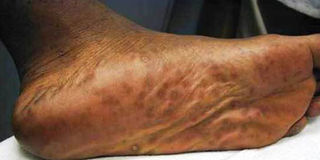15 years after treatment, I still have syphillis

In 2003, while pregnant, I was checked and found to have syphilis, which was treated with penicillin injections. However, last year, after 15 years, a test called TPHA was done and showed that I still have syphilis. Was I given the wrong treatment? Tryphosa
Dear Tryphosa,
Syphilis is an infection caused by a bacterial germ usually spread sexually. Because of antenatal and transfusion blood screening, the infection is rarely spread congenitally or through blood transfusion. The disease starts with a painless wound called a chancre in the area where the germs entered from (usually the genitals, rectum or mouth depending on the type of sex). This is called primary syphilis.
Within a few weeks of the original chancre healing, one may experience a non-itchy rash that may affect the trunk, palms or soles of the feet or the entire body.
There may also be other symptoms including a fever and swollen lymph glands. This is called secondary syphilis. Without treatment, the symptoms may disappear for a long time (latent syphilis) until one gets complications involving damage to the brain, nerves, eyes, heart, blood vessels, liver, bones and joints (tertiary syphilis).
In Uganda, the most performed tests for syphilis are those which look for the body’s reaction to the syphilis germs (antibodies) and these include VDRL (Venereal Disease Research Laboratory), which gives a lot of false positives and more accurate treponemal pallidum hemagglutination test (TPHA) which is more accurate.
These antibody tests, however, remain positive for many years even after cure. This may force one to keep changing doctors with false accusations of failing to be cured. More expensive (and not commonly done) tests such as Treponema pallidum polymerase chain reaction (PCR) however may be done to confirm failure to be cured.




